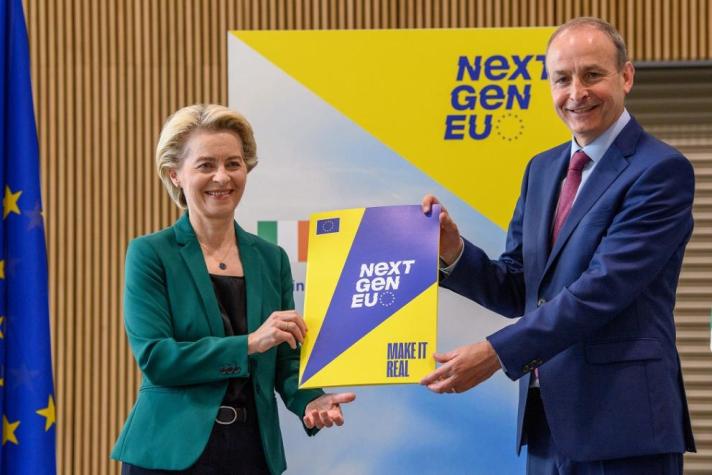In December 2020, the leaders of all European Union countries, the European Parliament and the European Commission agreed on a Recovery Plan to help repair the economic and social damage brought about by the COVID-19 pandemic.
Through the EU’s long-term budget, together with the temporary NextGenerationEU instrument, a total of €2.018 trillion was set aside to help build a greener, more digital and more resilient Europe.
In June 2023, the European Commission proposed to further reinforce the long-term budget in response to the unforeseen challenges posed by Russia’s unprecedented brutal invasion of Ukraine and an unexpected increase in post-pandemic irregular migration.
What is in the EU Recovery Plan?
The long-term EU budget, which was topped up to meet the COVID-related challenges, ensures that more than 50% of the Recovery Plan is dedicated to modernisation, through research and innovation, climate and digital transitions, and preparedness, recovery and resilience.
This forward-thinking package, in line with the European Green Deal, will fight climate change and at least 30% of the EU budget will be spent on this priority. It will also pay specific attention to biodiversity protection.
NextGenerationEU provides an additional €806.9 billion, and €723.8 billion (in current prices) of this will be delivered through the Recovery and Resilience Facility (RRF), which provides loans and grants to support structural reforms and investments undertaken by EU countries.
The European Commission has also implemented a new Technical Support Instrument (TSI) to provide tailor-made expertise for EU countries to design and implement reforms without the need for co-financing from Member States.
The European Semester, which is the framework to coordinate and monitor EU economic policy, has also been adapted as it is closely linked to the Recovery and Resilience Facility, and this will ensure that structural reforms are an integral part of the recovery for each country.
To access the Recovery and Resilience funds, each EU member country has provided a national Recovery and Resilience Plan (RRP), in which at least 37% of expenditure is allocated to climate and 20% to digital investments and reforms. The plans must be implemented by 2026.
The Recovery and Resilience Facility
Economic recovery in Ireland
The Irish economy recovered stronger than most EU Member States from the COVID-19 pandemic with economic growth of 12% recorded in 2022.
However, Ireland recorded negative GDP growth of 3.2% in 2023 and is predicted to again record negative growth (of 0.5%) in 2024, mainly due to a contraction in the multinational sector in the first half of the year. In its Autumn 2024 Economic Forecast, the European Commission predicted that Ireland's economy would rebound in 2025 and grow by 4.0% supported by a strong labour market, low headline inflation and a favourable external environment.

Inflation that peaked at 8.1% in 2022 dropped to 5.2% in 2023 and is predicted to fall further to 1.4% in 2024 before rising slightly to 1.9% in 2025.
Ireland’s general government budget is projected to register a surplus of 4.4% of GDP in 2024. A large share (2.7 pps) of it is driven by a one-off in revenue due to the EU Court of Justice’s ruling of 10 September 2024 concerning tax ruling relating to two Apple group companies.
In 2025, the surplus is forecast to recede to 1.4% of GDP as revenue growth is projected to slow down in the absence of one-off revenue such as that seen in 2024.
According to the November 2024 Post-Programme Surveillance Report for Ireland, Irish public finances appear sound. Ireland is expected to report general government surpluses in 2024 (4.4% of GDP), 2025 (1.4% of GDP) and 2026 (1.3% of GDP), based on a strong performance in sectors that account for a large share of corporate and income tax receipts. The unusually large surplus of more than €23 billion in 2024 is driven by a one-off transfer arising from a Court of Justice of the European Union ruling. Government expenditure increases continue to be mostly driven by social payments and wage rises in the public sector. The government debt-to-GDP ratio is projected to continue decreasing over the forecast horizon. In mid-October, Ireland presented its medium-term fiscal-structural plan, as required by the new economic governance framework.
In its 2024 European Semester report, the Commission found that Ireland's draft budgetary plan for 2025 was not fully in line with the ceiling set out in its medium-term plan. Under the EU's new economic governance framework, which entered into force in April 2024, all Member States must submit medium-term plans Integrating fiscal, reform and investment objectives. Net expenditure in Ireland is projected to be above the ceiling set out in its plan.
November 2024 Post-Programme Surveillance Report for Ireland
What’s in the Recovery Plan for Ireland?
NextGenerationEU, the EU’s temporary recovery instrument, includes specific supports for sectors important to Ireland, such as agriculture, to secure food supplies and protect the income of farmers.

- Ireland is set to receive over €1.1 billion in Recovery and Resilience Facility grants. There was also €89 million available in 2021 under REACT-EU and €85 million from the Just Transition Fund. In December 2022, it was announced that Ireland was to receive an additional €53 million under REACT-EU to further support the recovery and welcome people fleeing Russia’s invasion of Ukraine.
- Ireland will also receive almost €1.4 billion in Cohesion Policy allocations from the latest long-term EU budget, as well as just over €8.3 billion in direct payments from the European Agricultural Guarantee Fund (EAGF). There will also be €2.25 billion available through the European Agricultural Fund for Rural Development.
- In 2021, the European Commission disbursed €2.47 billion in financial support to Ireland under the SURE instrument. The support was provided in the form of loans granted on favourable terms to assist Ireland in covering the costs related to its Temporary COVID-19 Wage Subsidy Scheme.
- The European Commission has adopted a Temporary Crisis and Transition Framework to support the recovery in the context of Russia's war against Ukraine. This allows for limited flexibility of EU State Aid rules that are designed to prevent unfair competition.
- In 2020 the Commission approved two Irish State Aid schemes worth €10 and €7 million to Ireland’s coach tourism and entertainment sectors, which were badly hit by the pandemic.
- It also approved a €45 million Irish scheme to support companies active in the beef sector and a €60 million Irish scheme to support small and medium-sized enterprises (SMEs) affected by the coronavirus pandemic.
- In July 2021, the Commission approved a €9.5 million Irish scheme to support not-for-profit entities in the context of the coronavirus outbreak. And, in August 2021, the Commission approved a €11.5 million Irish scheme to support companies active in the events sector and a €15 million Irish scheme to support commercial bus operators affected by the coronavirus outbreak.
- Other Irish State Aid schemes approved under the framework include a €500 million support scheme aimed at providing investment towards a sustainable recovery, a €200 million scheme to support Irish companies impacted by Russia’s invasion of Ukraine, and an €18 million scheme to support the road haulage sector in Ireland. A €450 million scheme to support the construction of apartments exclusively for owner-occupiers in Dublin, Cork, Galway, Limerick and Waterford was also given the green light.
- Ireland will also be the largest recipient of the €5 billion Brexit Adjustment Reserve fund.
Ireland Cohesion Policy funding
Examples of RRF supported projects in Ireland



Delivering Ireland’s Recovery Plan
The Irish Government carried out a public consultation on its Recovery and Resilience Plan (RRP) in February 2021. This consultation sought input on which areas Ireland should prioritise for investments and reforms, and which country-specific recommendations are considered the most relevant for Ireland’s plan.
This feedback was integrated into the draft plan which was submitted by the Irish Government to the European Commission on 28 May 2021.
On 16 July 2021, the Commission adopted a positive assessment of Ireland's RRP, which was then formally adopted by the Council in September 2021.

However, while progress is underway, Ireland has experienced significant technical delays in implementing its plan. Ireland has modified its plan twice. A surgical revision of the Irish plan was adopted by the Council on 14 July 2023. This revision involved changing the completion dates for two measures because timelines were no longer achievable due to objective circumstances. A broader revision of the Irish plan was adopted by the Council on 8 December 2023. The second amendment reflects the downward revision of Ireland’s grant allocation due to the country’s better than expected economic performance post Covid. The second amendment removed two measures from the plan and in addition, five measures have been changed based on objective circumstances. Finally, Ireland’s REPowerEU chapter is expected to be submitted in Q1 2024.
The Irish RRP consists of 24 measures, made up of 14 investment measures and ten reforms (including audit and control) supported by almost €1 billion in grants. The plan allocates 42% of its budget to support climate investments and reforms and 34% to foster the digital transition. The remainder of the plan is allocated to Social and Economic Recovery and Job Creation.
Projects in Ireland supported by Recovery and Resilience Facility grant funding include €164 million for the electrification of commuter rail services in Cork, €39 million for a Government data centre at Backweston Campus, Co Kildare, to facilitate more environmentally-efficient use of technology, and €60 million for the a Public Sector Retrofit Project involving the refurbishment of Tom Johnson House in Dublin to transform it into an exemplary, energy-efficient headquarters for the Department of the Environment, Climate and Communication.
The Recovery and Resilience Facility is also supporting several investments in Ireland where funds are distributed across the whole country. These include:
- The €72 million National Challenge Programme for research into developing solutions to the key challenges of the green transition and digital transformation.
- €108 million in grant funding for the rehabilitation of 33,000 hectares of peatlands across 82 bogs owned by Bord Na Móna.
- €64 million in grant funding for high-speed broadband connectivity, devices and software to ensure primary and post-primary school pupils are equipped with appropriate digital skills.
- The Irish RRP is also supporting reforms such as the digital transformation of education and training in Ireland at all levels (schools, third level, lifelong learning). Examples of these reforms include Ireland’s Digital Strategy for Schools and the 10 Year Adult Literacy, Numeracy and Digital Literacy Strategy.
Ireland’s recovery and resilience plan - European Commission webpage
